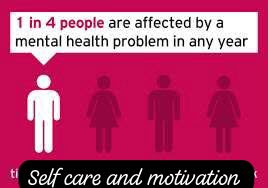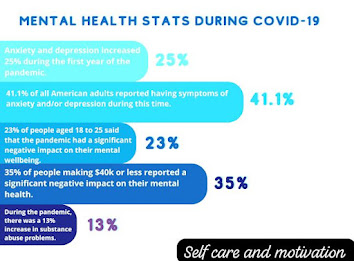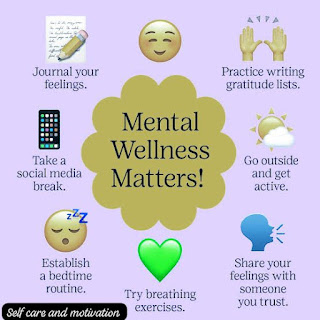Title: Mental Health: A journey of Healing and Mental Wellness: Seek Help
Introduction:
In the hustle and bustle of our modern era, where time slips through our fingers and demands relentlessly knock on our doors, the significance of mental health has emerged as a pressing and indispensable subject of discourse. The impact of mental health on individuals, families, and society as a whole cannot be understated.
This blog aims to provide a comprehensive guide to understanding mental health, its importance, and practical strategies for achieving and maintaining well-being. So, let's delve into this essential aspect of our lives and explore the ways in which we can nurture our mental health.
1. What is Mental Health?
Before diving deeper, it's crucial to define mental health. Mental health subjects to our emotional, psychological, and social well-being. It affects how we think, feel, and act, shaping our ability to handle stress, relate to others, and make choices. Mental health encompasses a wide range of conditions, from common mood disorders to severe mental illnesses. It is important to recognize that mental health is a spectrum, and everyone falls somewhere along this continuum.
2. Mental Health Statistics:
Mental health statistics provide insight into the prevalence, impact, and challenges associated with mental health conditions. Here are some brief statistics on mental health.
Global Burden:
Mental health disorders affect people worldwide. According to the World Health Organization (WHO), approximately 1 in 4 people will observe a mental health issue at some point in their lives.
Common Disorders:
Depression and anxiety are two of the most prevalent mental health disorders globally. Depression affects more than 264 million people, and anxiety disorders affect around 284 million people worldwide.
Suicide Rates:
Suicide is a significant concern related to mental health. It is estimated that every year, close to 800,000 people die by suicide globally, making it the second leading cause of death among individuals aged 15-29.
Mental Health Stigma:
Stigma and discrimination against individuals with mental health conditions remain a significant barrier to seeking help. Many people hesitate to disclose their mental health issues due to fear of social judgment or negative consequences.
Economic Impact:
Mental health conditions have a substantial economic impact on individuals and societies. It is estimated that by the year 2030, the global cost of mental health conditions will exceed $6 trillion in lost economic output.
Treatment Gap:
There is a significant treatment gap in mental health care. Many individuals with mental health conditions do not receive adequate treatment and support. This treatment gap is due to various factors, including lack of resources, stigma or ashamed, and limited access to mental health services.
Impact of COVID-19:
The COVID-19 pandemic has further exacerbated mental health challenges globally. Increased levels of stress, anxiety, and depression have been reported due to factors such as isolation, fear of illness, economic uncertainties, and disrupted routines.
It's important to note that mental health statistics can vary across different regions, age groups, and socioeconomic backgrounds. These statistics highlight the need for increased awareness, support, and resources to address mental health issues effectively.
3. The Importance of Mental Health:
Maintaining good mental health is important for overall well-being. Just as we prioritize physical health, nurturing our mental health is equally essential. Mental health affects all aspects of our lives, including our relationships, work performance, and physical health. By taking care of our mental health, we enhance our resilience, cope with life's challenges, and improve our quality of life.
4. Common Mental Health Conditions:
There are various mental health conditions that individuals may observe. These conditions can range from anxiety disorders, such as generalized anxiety disorder and panic disorder, to mood disorders like depression and bipolar disorder. Other conditions include post-traumatic stress disorder (PTSD), obsessive-compulsive disorder (OCD), and schizophrenia. It's important to note that seeking professional help and support is crucial for diagnosis and treatment.
5. Recognizing the Signs and Symptoms:
Recognizing the signs and symptoms of mental health conditions is an essential step towards seeking help. These signs may include persistent sadness, changes in appetite or sleep patterns, withdrawal from social activities, loss of interest in previously enjoyed activities, difficulty concentrating, and unexplained physical symptoms. It's important to be aware of these signs in ourselves and others, as early intervention can lead to better outcomes.
6. Practical Self-care Tips for Maintaining Good Mental Health:
Fortunately, there are numerous strategies we can implement to promote positive mental health. These include:
Self-care Practices:
Engaging in self-care activities, such as regular exercise, maintaining a balanced diet, getting enough sleep, and practicing relaxation techniques like meditation or yoga, can significantly contribute to our mental well-being.
Building a Supportive Network:
Fostering meaningful connections with family, friends, and communities can provide a strong support system during challenging times. Sharing our feelings and experiences with trusted individuals helps reduce feelings of isolation and enhances our overall mental health.
Managing Stress:
Learning effective stress management techniques, such as time management, prioritization, and setting boundaries, can reduce the impact of stress on our mental health. Engaging in hobbies, pursuing creative outlets, and practicing mindfulness can also be beneficial.
The benefits of therapy: Healing through professional support
When needed, seeking professional help from mental health practitioners is crucial. Mental health professionals, such as psychologists or psychiatrists, can provide therapy, prescribe medication if necessary, and guide individuals towards better mental well-being.
Challenge Negative Thoughts:
Anxiety and depression often involve negative thinking patterns. Observe recognizing and challenging negative thoughts or cognitive distortions. Replace negative thoughts with more realistic, practical and positive ones. Cognitive-behavioral therapy (CBT) techniques may be helpful in this process.
Set Realistic Goals:
Break tasks into smaller, manageable steps and set realistic goals for yourself. Celebrate even the smallest achievements, as they can boost your self-esteem and provide a sense of accomplishment. Avoid putting too much pressure on yourself, and remember that progress takes time.
Engage in Activities You Enjoy:
Find activities or hobbies that bring you joy and help distract your mind from anxious or depressive thoughts. Engaging in activities you love can provide a sense of purpose, fulfillment, and relaxation. It could be reading, praying, painting, listening to music, or spending time in nature.
Practice Mindfulness:
Mindfulness involves focusing on the present moment without judgment. By practicing mindfulness techniques, such as mindful breathing or body scans, you can become more aware of your thoughts and emotions. This can help you develop a greater sense of control and reduce anxiety and depressive symptoms.
Avoid Isolation:
Although it may be tempting to withdraw and isolate yourself when you're feeling anxious or depressed, it's important to stay connected with others. Engage in social activities, reach out to friends, or consider joining support groups where you can connect with individuals facing similar challenges.
Limit Stress:
Identify and manage sources of stress in your life. This could involve setting boundaries, learning effective time management techniques, and practicing stress-reducing activities such as taking breaks, practicing relaxation exercises, or engaging in hobbies.
Be Patient and Kind to Yourself:
Remember that healing takes time, and setbacks are a normal part of the process. Treat yourself with compassion, practice self-acceptance, and be patient as you work towards managing your anxiety and depression. Celebrate small victories along the way and seek support when needed.
Remember, everyone's journey is unique, different and what works for one person may not work for another. It's important to find coping strategies and treatments that suit your individual needs. With the right support, self-care, and resilience, you can manage anxiety and depression and lead a fulfilling life.
7. Coping with Anxiety and Depression:
Dealing with anxiety and depression can be challenging, but it's important to remember that you are not alone. Many people face these mental health conditions, and there are effective coping strategies that can help you navigate through them.
8. The Connection Between Mental and Physical Well-being:
The connection between mental and physical well-being is profound and undeniable. Both aspects of our health interact synergistically, impacting our overall quality of life. Nurturing mental well-being through stress management,
emotional support, and seeking help when needed can have significant positive effects on physical health.
Likewise, maintaining physical well-being through exercise, adequate sleep, and a nutritious diet contributes to optimal mental health. Recognizing and addressing the interplay between these two dimensions is vital for achieving a balanced and fulfilling life.
Conclusion:
In conclusion, understanding and prioritizing our mental health is crucial for leading a fulfilling and balanced life. By recognizing the importance of mental health, familiarizing ourselves with common conditions, and implementing strategies for promoting well-being, we can embark on a journey towards optimal mental health. Remember, mental health matters, and investing in it is a valuable endeavor that can positively impact every aspect of our lives.
By focusing on self-care, building a support network, managing stress effectively, and seeking professional help when needed, we can nurture our mental health and contribute to a healthier society as a whole. Let us take this opportunity to prioritize our mental well-being and encourage others to do the same. Together, we can create a world where mental health is valued and supported.
If you or someone you know is struggling with mental health, it is crucial to seek help from a qualified healthcare professional or helpline in your country.











2 Comments
much needed
ReplyDeleteMental health is important
ReplyDelete